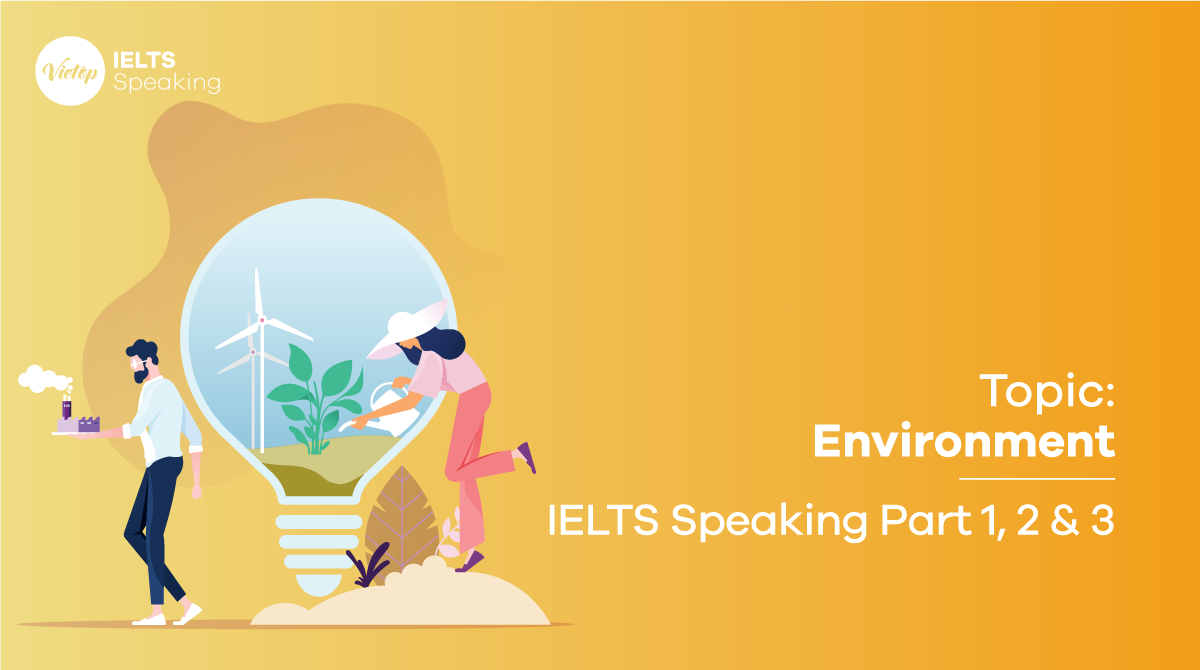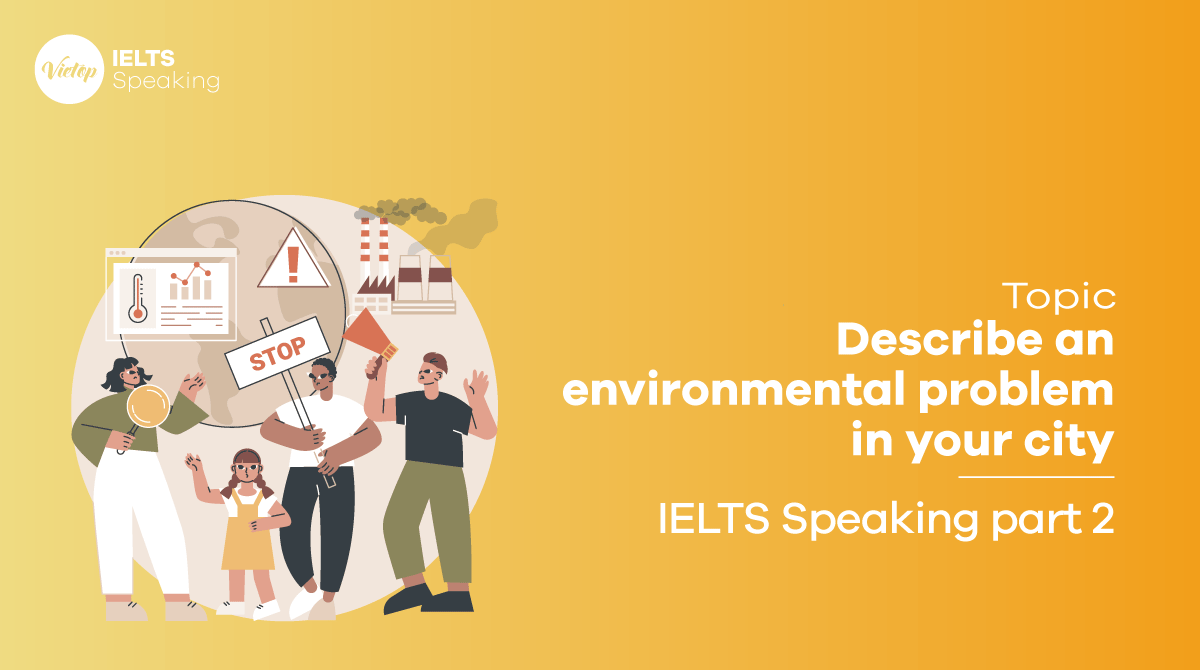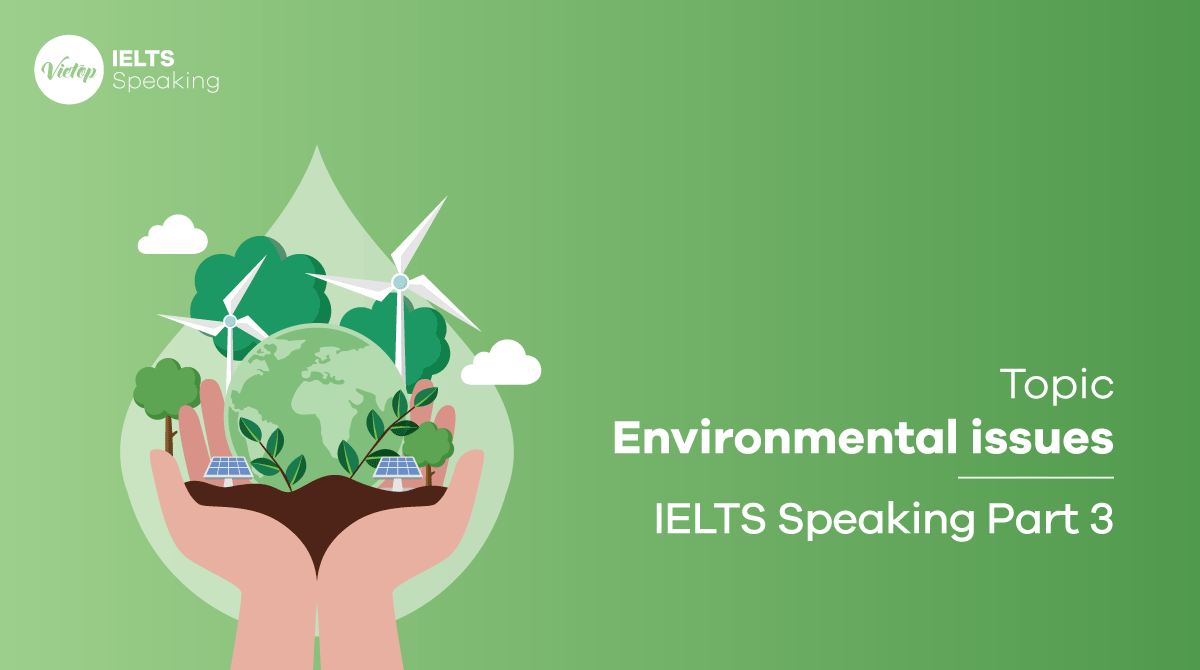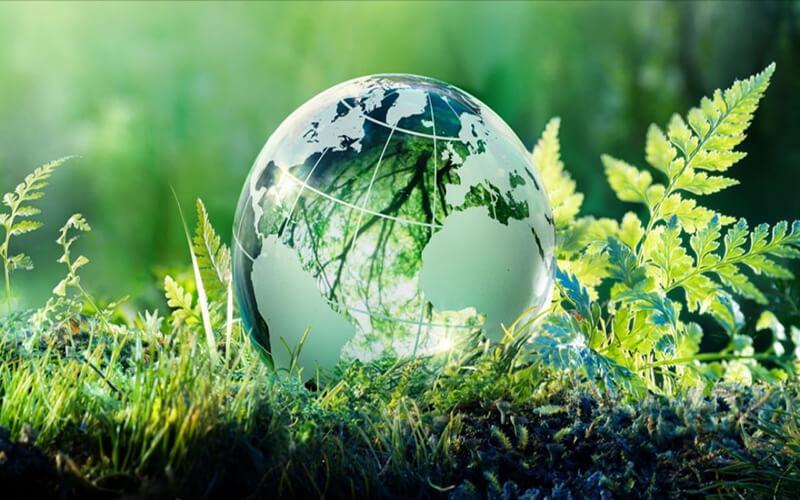Với bài viết hôm nay, IELTS Vietop mời các bạn cùng tham khảo qua phần bài mẫu topic Environment IELTS Speaking Part 1, 2, 3 và một số từ vựng liên quan topic Environment – môi trường.
Mặc dù là chủ đề gần gũi, quen thuộc nhưng bạn đã biết trả lời như thế nào để gây ấn tượng với ban giám khảo chưa? Dưới đây là vài mẫu câu và từ vựng liên quan đến topic này, xem ngay để ôn luyện thi IELTS ngay nhé!
1. Bài mẫu topic Environment IELTS Speaking part 1

Mời bạn nghe Audio topic Environment part 1 tại đây nhé!
1.1. What do you do to prevent our environment from pollution?
Well, I have done a lot of things. First, I don’t litter indiscriminately. Additionally, my family always purchases environmentally friendly products as much as possible. Finally, I try to use public transport whenever I can, so that I can contribute to reducing air pollution…
Từ vựng ghi điểm:
- Indiscriminately (adv): bừa bãi, không cẩn thận
- Environmentally friendly (adj): thân thiện với môi trường
1.2. Do you think pollution is a problem today?
Absolutely, yes. In the modern world, pollution of the air and water is a major problem. The intensity of the air pollution issue is worsened by the rise in vehicle exhaust emissions, which harms the quality of the air.
Từ vựng ghi điểm:
- Intensity (n): mức độ
- Worsen (v): làm cho tồi tệ hơn
- Exhaust emissions (n): khí thải
Xem ngay: Khóa học IELTS Cấp tốc – Cam kết tăng ít nhất 0.5 – 1.0 band score SAU 1 THÁNG HỌC
1.3. Are there any environmental problems in your country?
As far as I know, Vietnam now is a developing country and has been industrializing and modernizing. As a result, the number of manufacturers has increased dramatically over the past few decades, along with serious issues such as air or water pollution. Many people, especially those who live in industrial areas, have been affected by these issues. They have to suffer from not only dirty water but also respiratory illnesses.
Từ vựng ghi điểm:
- Industrialize (v): công nghiệp hóa
- Modernize (v): hiện đại hóa
- Dramatically (adv): đáng kể
- Respiratory (adj): thuộc hô hấp
Xem thêm:
- Bảng chữ cái tiếng Anh
- Tại sao IELTS không có điểm 10
- Describe a person you know who likes to help others
1.4. What causes environmental problems?
From my point of view, there are a lot of things which lead to environmental issues. However, the biggest cause of this problem is human activities. For building and farming, people destroy forests, which has an adverse effect on the ecosystem and wildlife habitats. Additionally, the growth in CO2 levels caused by industrial activity contributes to global warming and increases greenhouse gas emission.
Từ vựng ghi điểm:
- Environmental issues: (n) vấn đề môi trường
- Adverse (adj): bất lợi
1.5. Would you like to work in a company related to environmental protection?
Yes, I would even go further to say that most if not all companies should consider their impacts on the environment. I don’t think that companies that specialise in environmental protection can be the silver bullet to our problems.
Từ vựng ghi điểm:
- To specialise in: chuyên về
- The silver bullet: (ẩn dụ) phương thuốc thần kỳ, cách giải quyết mọi vấn đề
Bạn muốn cải thiện kỹ năng Speaking với những tips và chiến thuật trả lời giúp ghi điểm với ban giám khảo. Khoá luyện IELTS 3.0 – 5.0 của IELTS Vietop – nơi mang đến cho bạn lộ trình học cá nhân hoá, không chỉ tự tin chinh phục ban giám khảo trong phòng thi mà còn vận dụng được kiến thức thật trong đời sống thực tế. Tham khảo ngay.
1.6. How can we protect the environment?
We need to first take baby steps as individuals. Simple things like picking up rubbish, recycling and minimizing our fuel use are starting points. After that, we can coordinate our efforts at the societal level like eliminating fossil fuel and reducing the impact of climate change.
Từ vựng ghi điểm:
- To coordinate (v): hợp sức, hợp tác làm gì đó
- Society (adj): cộng đồng, quy mô xã hội
1.7. Do you think you’ve done enough to protect the environment?
No definitely not, I still throw away various single-use plastic products every day. Currently, there aren’t any recycling programmes where I live. I hope this will change soon.
Từ vựng ghi điểm:
- Single-use (adj): sử dụng một lần
1.8. Is there education about environmental protection at school?
Yes, but largely, they only teach about the theory. I think they should make recycling a part of schools’ curriculum, with the teachers supervising and helping the students to do it correctly.
Từ vựng ghi điểm:
- Curriculum (n): giáo trình
Bên cạnh bài mẫu Speaking Part 1, 2, 3, chúng tôi còn cung cấp thêm nhiều bài mẫu hay khác về chủ đề môi trường để bạn luyện tập.
Để nhận thêm bài mẫu mới nhất, hãy điền tên và số điện thoại của bạn vào form đặt chỗ ở TẠI ĐÂY.
Bạn sẽ nhận được:
- Những bài mẫu mới về các chủ đề môi trường thường gặp trong bài thi IELTS Speaking.
- Các mẹo và chiến lược để trả lời các câu hỏi về môi trường một cách hiệu quả.
- Thông tin về các nguồn tài liệu hữu ích khác để luyện thi IELTS Speaking.
Lưu ý: Số lượng bài mẫu có hạn, nhanh tay đăng ký để không bỏ lỡ cơ hội!
Tham khảo:
- Health and Fitness IELTS Speaking
- Transportation IELTS Speaking part 1
- House and Cooking IELTS Speaking part 1
Đừng bỏ lỡ cơ hội! Đăng ký ngay để bắt đầu hành trình học IELTS online!

Nhận tư vấn miễn phí khóa học hè
2. Describe an environmental problem in your city – Bài mẫu IELTS Speaking part 2
Mời bạn nghe Audio topic Environment part 2 tại đây nhé!
Describe an environmental problem in your city. You should say:
- What type of problem it is
- Why it had happened
- How the problem can be controlled

I’ve been a resident in Hanoi for about 20 years, during which time I’ve had the chance to see several serious environmental problems. The city’s environment has been substantially degraded as a result of the rising number of tourists and immigrants from other regions. One significant issue is littering; numerous people have left their trash in inappropriate places including on the road, at bus stops, and in waterways.
I think the fundamental cause of this issue is overcrowding. This is the consequence of a variety of factors including rising birth rates, advancements in healthcare, rising living standards, and immigration. Along with that, a major factor is a lack of education. People simply continue to litter out of habit since they are not completely aware of the effects it has on the environment.
I would advise the local authorities to severely punish anyone found depositing trash in the wrong places in order to put an end to this problem. They will be discouraged from releasing illegal garbage in the future by this. Another option is for the government to launch some media efforts to educate the public about the value of preserving the environment and nature. For instance, broadcasting TV commercials that highlight the threat posed by global warming may have a significant impact on viewers’ attitudes toward environmental conservation.
Từ vựng ghi điểm:
- Substantially degraded: bị giảm chất lượng một cách đáng kể
- Immigrants (n): người nhập cư
- Overcrowding (n): sự đông dân số
- Consequence (n): hậu quả
- Advancements (n): những sự cải tiến
- Litter = Depositing trash: vứt rác
- Broadcast (v): trình chiếu (lên các phương tiện truyền thông)
- Environmental conservation: sự bảo tồn thiên nhiên
Bạn đã sẵn sàng chinh phục IELTS? Kiểm tra trình độ của bạn với bài thi thử IELTS MIỄN PHÍ của IELTS Vietop mô phỏng chính xác cấu trúc đề thi thật của British Council (BC) và IDP.
Xem thêm:
- Bài mẫu IELTS Speaking topic Family
- Talk about your best friend
- Bài mẫu topic Name IELTS Speaking part 1
3. Bài mẫu topic Environment IELTS Speaking part 3
Trong phần IELTS Speaking part 3, sẽ có một số câu hỏi thông dụng dưới đây, bạn tham khảo để chuẩn bị thật tốt cho chủ đề này nhé.

Mời bạn nghe Audio topic Environment part 3 tại đây nhé!
3.1. Is there much more environmental damage now than in the past?
Yes, there has certainly been an increase in environmental pollution over time. There has been a significant increase in pollution and waste production due to the industrialization of civilization and the expansion of international trade. The ecosystem has suffered as a result, leading to issues like climate change, deforestation, and water shortages.
Từ vựng ghi điểm:
- Industrialization (n): sự công nghiệp hoá
- International trade: giao thương quốc tế
- Ecosystem (n): hệ sinh thái
- Deforestation (n): sự phá rừng
- Water shortage (n): sự thiếu nguồn nước
3.2. What can people do to help reduce pollution?
People can take a variety of actions to reduce pollution. Conserving energy is one way. This can be accomplished by avoiding solo driving by taking public transit or joining a carpool, turning off lights when not in use, and disconnecting electronics. Recycling, reusing, and reducing waste are other ways to lessen pollution. This entails staying away from items that come in a lot of packaging, switching to reusable bags from plastic ones, and recycling objects rather than throwing them away.
Từ vựng ghi điểm:
- Take action: thực hiện hành động
- Conserve (v): bảo tồn
- Carpool (n): hình thức đi chung xe để tiết kiệm nhiên liệu, chi phí
3.3. Do you think that governments or private citizens are more responsible for protecting the environment?
I believe that protecting the environment is a shared responsibility of governments and citizens. People may conserve energy, cut back on consumption, and recycle on an individual basis. Governments can still be of assistance by enacting legislation to cut pollution and funding renewable energy sources. I believe that by working together, we can safeguard the environment!
Từ vựng ghi điểm:
- Cut back on s.th: cắt giảm cái gì
- Legislation (n): hiến pháp, luật pháp
3.4. Is it important for children to learn about animals?
Answer sample: Absolutely yes! In my view, teaching children about animals is not enough. Teachers and families need to teach them how to protect the wildlife. The environment and animals have been damaged at an alarming rate. If this problem lasts longer, many animals will be on the brink of extinction. Therefore, we should in charge of raising children’s awareness of protecting wildlife to maintain the sustainable development of the world.
Từ vựng ghi điểm:
- Sustainable development: phát triển bền vững
- At an alarming rate: ở mức dao động
3.5. What is your opinion on keeping endangered animals in the zoo?
Answer sample: I completely disagree with this point of view. I think when keeping animals teetering on the brink of extinction in the zoo, they will lose their natural abilities like hunting ability, sense of hearing, or eyesight. As per Darwinism, when a species loses their natural abilities, they will evolve into a new one. That means keeping endangered animals in the zoo may lead to the total extinction of that species.
Từ vựng ghi điểm:
- Evolve (v): tiến hóa
- Natural abilities: khả năng tự nhiên
- Teetering on the brink of extinction: trên bờ vực tuyệt chủng
3.6. What is your opinion on animals that are used for meat and other purposes?
Answer sample: It’s a very hard question, I have never thought about it before. But I think that when animals are used for meat, it can be acceptable as long as they are cattle and poultry. But for some other purposes like vivisection and poaching, it is very barbaric and needs to be abolished. Because these purposes may pose a threat to the existence and sustainable development of many species.
Từ vựng ghi điểm:
- Existence (n): sự tồn tại
- Pose a threat: đe dọa đến
- Abolish (v): loại bỏ
- Barbaric (adj): cực kỳ xấu xa
- Poach (v): săn bắt trái phép
- Vivisection (n): thí nghiệm trên động vật
- Poultry (n): gia cầm
- Cattle (n): gia súc
3.7. What can we do to protect rare species of animals?
Answer sample: On the one hand, we should improve other people’s green credentials. Through that, they have a better awareness of protecting the wildlife and more appropriate actions to deal with a natural catastrophe. On the other hand, we should provide safe natural habitat to rare species of animals to maintain their sustainable development and protect their offsprings.
Từ vựng ghi điểm:
- Offsprings: con cái (thế hệ sau)
- Natural catastrophe: thảm họa tự nhiên
- Green credentials: nhận biết tầm quan trọng của bảo vệ môi trường
3.8. What should the government do to protect wildlife?
Answer sample: Personally, I strongly believe that the government has to impose stricter laws as a deterrent to put an end to blood sports. Ya know hunting wild animals is increasingly popular on an unprecedented scale and their habitats have been damaged at an alarming rate. If the government does not severely punish these criminal activities, the wildlife is soon dying out.
Từ vựng ghi điểm:
- Dying out: dần biến mất (tuyệt chủng)
- Criminal activities: hành động phạm tội
- On an unprecedented scale: ở mức độ chưa từng thấy
- Blood sports: săn bắn vì mục địch giải trí
- Put an end: chấm dứt
- Deterrent: răn đe
3.9. How to stop humans from harming the environment?
Answer sample: I think that it’s all about providing them knowledge about the environment. When people have a deeper insight into the consequences that they have to face when the environment is damaged, they will change their daily habits and take the right action to protect it. Most people continuously do harm to the surroundings just because they are not aware of the negative effect on the environment. So with better understanding, we will save the world.
Từ vựng ghi điểm:
- Deeper insight into: nhận thức tốt hơn
4. Từ vựng về topic Environment IELTS Speaking

| Từ vựng | IPA | Tiếng việt |
| Global warming | ɡləʊ.bəl ˈwɔː.mɪŋ | Ấm lên toàn cầu |
| Biodegradable | baɪ.əʊ.dɪˈɡreɪ.də.bəl | Phân hủy sinh học |
| Biodiversity | baɪ.əʊ.daɪˈvɜː.sə.ti | Sự đa dạng sinh học |
| Pollution | pəˈluː.ʃən | Sự ô nhiễm |
| Pollutant | pəˈluː.tənt | Chất gây ô nhiễm |
| Contamination | kənˌtæm.ɪˈneɪ.ʃən | Sự ô nhiễm, sự nhiễm độc |
| Greenhouse | ɡriːn.haʊs | Nhà kính |
| Deforestation | diːˌfɒr.ɪˈsteɪ.ʃən | Sự phá rừng |
| Emission | iˈmɪʃ.ən | Sự phát thải |
| Soil erosion | sɔɪl ɪˈrəʊ.ʒən | Sự xói mòn đất |
| Ecosystem | iː.kəʊˌsɪs.təm | Hệ sinh thái |
| Preservation | prez.əˈveɪ.ʃən | Sự bảo tồn |
| Ozone layer | əʊ.zəʊn ˌleɪ.ər | Tầng Ozon |
| Contaminate | kənˈtæm.ɪ.neɪt | Làm ô nhiễm |
| Decay | dɪˈkeɪ | Phân hủy |
| Exploit | ɪkˈsplɔɪt | Khai thác |
| Abuse | əˈbjuːz | Lạm dụng |
| Tackle / cope with | tæk.əl | Giải quyết |
| Curb | kɜːb | Hạn chế |
| Destroy | dɪˈstrɔɪ | Phá hủy, tàn phá |
| Threaten natural habitats | ˈθret.ən ˈnætʃ.ər.əl ˈhæb.ɪ.tæt | Đe dọa môi trường sống tự nhiên |
| Degrade ecosystems | dɪˈɡreɪd ˈiː.kəʊˌsɪs.təm | Làm suy thoái hệ sinh thái |
| Poisonous | pɔɪ.zən.əs | Độc hại |
| Excessive | ekˈses.ɪv | Quá nhiều |
| Serious/severe/acute | sɪə.ri.əs | Nghiêm trọng,tồi tệ |
| Fresh/pure | freʃ | Tinh khiết, trong sạch |
| Environmentally-friendly | ɪn.vaɪ.rənˌmen.təl.i ˈfrend.li | Thân thiện với môi trường |
| Effective/efficient/efficacious | ɪˈfek.tɪv | Hiệu quả |
Trên đây là bài mẫu và từ vựng cho bài mẫu topic Environment IELTS Speaking part 1, IELTS Speaking part 2, IELTS Speaking part 3 – môi trường. IELTS Vietop hy vọng đã có thể giúp các bạn tham khảo được thêm nhiều từ vựng và ý tưởng để chuẩn bị tốt hơn cho chủ đề phức tạp này. Chúc các bạn học tốt!











